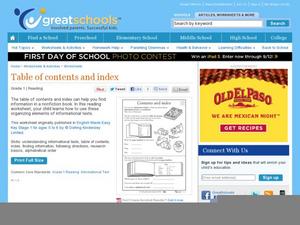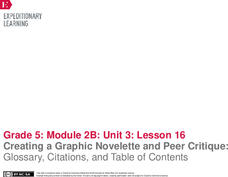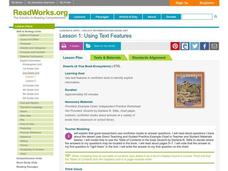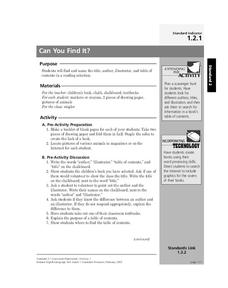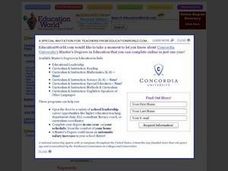Curated OER
Nonfiction Books: Table of Contents and Index
How do you find what you're looking for when reading a nonfiction book? Even first graders can learn how to use a table of contents and an index. They use the provided images of each to locate information and answer nine questions.
Curated OER
Contents Page 1 (Table of Contents)
After inspecting the illustrated sample of a Table of Contents provided on a one-page worksheet, primary readers write their responses to five questions based on the model.
Curated OER
Using a Table of Contents
While simple, this resource would be a great way to introduce your class to the use of the Table of Contents. It provides a step-by-step explanation describing how to find information. A teacher could supplement this presentation with...
Curated OER
Contents and Index
It's important for your readers to understand features of informational text such as index and table of contents, so give them this visual activity to get started. They read a brief explanation of informational text, then look at an...
Teacherfiles
Portfolio Contents
Learners can create a portfolio in any class and use this handy table of contents to organize their work effectively. Individuals are asked to include their best work alongside work that demonstrates areas for progress. The table of...
EngageNY
Creating a Graphic Novelette and Peer Critique: Glossary, Citations, and Table of Contents
A, B, C ... let's alphabetize to get organized! Using the informative resource, scholars create an alphabetized glossary of key words for their graphic novelettes. Additionally, they create a table of contents and citations page.
Curated OER
Table of Contents
In this table of contents worksheet, students read information about the table of contents and use a practice example to answer questions. Students answer four questions using the table of contents.
Curated OER
Using Text Features
Investigate a "table of contents" with your students! They read the table of contents in Deserts by Darlene R. Stille and predict where the answers to specific questions might be found. Learners complete a worksheet in which they find...
Curated OER
Can You Find It?
Plan a Parts of a Book scavenger hunt. Begin by giving your young adventurers a book, and asking them to find the title, author, illustrator, and table of contents. After a discussion of the purpose of each of these items, class members...
Curated OER
"Me" Resource
Learners elucidate themselves by writing up to six entries in different formats. Some formatting choices include a dictionary, encyclopedia, or atlas entry, a magazine article, a newspaper article, and a table of contents. Some...
Curated OER
Periodic Table of Fun
Are you looking to put the fun back in the fundamentals of chemistry? Why not have groups create their own periodic tables of something (animals, food, music groups, etc.) practicing the organizational strategies used in the periodic...
Curated OER
Identifying Features of Nonfiction Text
Learners explore nonfiction text. They identify the cover, title page, and table of contents of a nonfiction book. Pupils work in groups to create a chapter for a nonfiction class book about heroes.
Curated OER
Review Parts of a Book
Begin the year with a review of the parts of a book. Exercises in the unit plan ask emergent readers to identify the information on the cover of a book and on the title page, to explain the purpose of a table of contents, and to describe...
Curated OER
Library Lesson Plan: Table of Contents
Third graders create a table of contents. In this library skills lesson, 3rd graders read Welcome to the White House and use the provided worksheet to create a table of contents for the book.
Curated OER
Using the Table of Contents
Students critique a table of contents to find information in a book. Students locate their text books and then locate the table of contents in each one. Students research purposes for the table of contents in books.
Curated OER
Glossary, Index, and Table of Contents
Fourth graders use two separate sources to learn about index, glossary, and table of contents usage. In this library lesson plan, 4th graders use two books, Learning About Weather with Graphic Organizers, and The World Almanac for Kids,...
Wordpress
Equation Table Graph
Your Algebra learners will appreciate this fabulous, two-page printable. The first page has a list of numbers that lead to the learners writing an equation in a cloud that represents these numbers, and then filling in a table, and...
Curated OER
Periodic Table of Elements
In this science worksheet, students examine the graph with elements in order to differentiate atomic mass and categorizing the content.
Mathed Up!
Two Way Tables
When presented with categorical data, a two-way frequency table is a great way to summarize the information. Pupils organize categorical data using a two-way table, then use the tables to determine missing data and to calculate simple...
Curated OER
Reading Comprehension: History of the Periodic Table
Although the article that launches this lesson is about the history of the Periodic Table, the objective is reading comprehension. Using the eight-page informational text, learners answer five comprehension questions and craft one essay....
Curated OER
Chairs Around the Table
Youngsters become flexible problem solvers with this challenging lesson. If there are 24 square tables in a restaurant, how many customers can be seated at one time? They can use manipulatives or draw pictures to help them find the...
American Chemical Society
The Periodic Table and Transuranium Elements
The periodic table has so much more to it than meets the uninformed eye. An inquiry-based lesson leads learners through the history of the discovery of several transuranium elements. They then use informational resources to build a...
Mathed Up!
Frequency Tables
The section of a larger General Certificate of Secondary Education math review requires pupils to summarize numerical data presented in a frequency table. Scholars determine the number of data points, the range, the mean, and the...
University of Georgia
Energy Content of Foods
Why do athletes load up on carbohydrates the evening before a competition? The lesson helps answer this question as it relates the type of food to the amount of energy it contains. After a discussion, scholars perform an experiment to...
Other popular searches
- Using Table of Contents
- Table of Contents Index
- Table of Contents Sheets
- Table of Contents Worksheets
- Using a Table of Contents
- Table of Contents and Index
- Table of Contents Learning
- Table of Contents Lessons
- Using the Table of Contents
- Table of Contents, Headings





